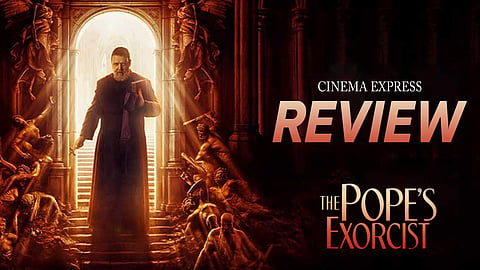The Pope’s Exorcist Movie Review: Russel Crowe’s horror feature is forgettable and sombre
Rating:(2.5 / 5)
Horror stories come with a special ring to them when it deals with the hedonistic nature of humans rather than just easy jump scares or disfigured creatures delivering the frights. Be it Mike Flanagan’s Midnight Mass unravelling the horrors of blind faith or Barbarian that explores the generational trauma of abuse, horror was just a medium to bare open the rotting side of the human psyche. The latest Russell Crowe-starrer, The Pope’s Exorcist, seems to want to enjoy the best of both worlds but gets weighed over by its need to stand as a flagbearer of a few concerning issues.
Director: Julius Avery
Cast: Russell Crowe, Daniel Zovatto, Alex Essoe, Peter DeSouza Feighoney, and others
Rating: 2.5/5
The Pope’s Exorcist is mainly set in Spain, 1987, and follows the life of Father Gabriele Amorth (Russell Crowe), a famed exorcist who is appointed by the Pope himself. Known for performing several hundreds of exorcisms, which also include deceiving dark forces to enter domestic animals like pigs only to ruthlessly sacrifice them. But is the dark force really supernatural when Amorth himself agrees that most of his cases are examples of psychosis and not possessions? This is the first time when the film slips to address some of the important questions of man-induced horror and instead resorts to upholding beliefs. The problem isn’t the absence of mental health professionals, given the era and religious backdrop the film is set in, but the flippant dismissal of issues.
However, what holds together the film is the multi-layered protagonist Father Amorth, who is not just a Bible-carrying, crucified-Jesus-figurine-
Amorth is called to help a family get rid of a demon that has possessed a member. Accompanied by Father Esquibel (Daniel Zovatto), we soon get to know that a family of three, mother Julia (Alex Essoe), daughter Amy (Laurel Marsden), and son Henry (Peter DeSouza Feighoney) just relocated to Spain to dispose of an abbey, the only thing left by the deceased man of the family. Soon enough, we get to know Spain isn’t a space for women, because why would Julia otherwise advise Amy not to dress as freely as she did in the US? This is just the start of the mixed bag of events where pertinent issues of human nature are addressed alongside delivering problematic takes, including demonising the victims.
After some mandatory shots of scary hallways and dainty walls, The Pope’s Exorcist does not slip from moving away from the template, with Henry getting possessed by a Devil, who calls himself blasphemy and nightmare, both of which stand in opposition to the Church. Peter puts a fantabulous show on this front. Soon Amorth, assisted by Esquibel are called to perform an exorcism on the Devil, which is known to feed on exorcists and manipulate their emotions using their weakest moments. But that is all we get to know about this antagonist. The process that Amorth and Esquibel make to know about Satanic forces, seems very staged and does not provide the coherence and right escalation needed to ambush the horror. Instead, the film relies on catacombs and skeletons to take up the mantle of telling the backstory, which is just a lazy writing choice.
Remember, how I mentioned demonising the victims? Amorth and Esquibel are confronted by the Devil who is known to use human guilt to trap them, and it is the stories involving women from their past that the Devil uses against them. It makes you wonder who the real demon is. Are demons no longer under the beds but inside our heads? Do we reserve the right to call ourselves saintly when a helping hand wasn’t extended to the ones at the receiving end of abuse and red-tapism? Interestingly, the film makes women suffer huge losses and trauma for their choices. But The Pope’s Exorcist puts a spin on it by making these women the faces of the devil. Now if that choice was made to hold a mirror to the men in question or demonise the victims is never explored until the end. Instead, it portrays the heroic nature of Amorth, before he went on to perform several thousands of exorcisms.
The film scores decently in its making, safely attempting to rely on a regular set of aesthetics reserved for horror films. But it hardly churns out any horror in its writing. Yes, it does attempt to address the horrifying truth of religious institutions and how abuse can be a recurring plague in such premises, but does the film attack it with all its might? It’s a sad no.

